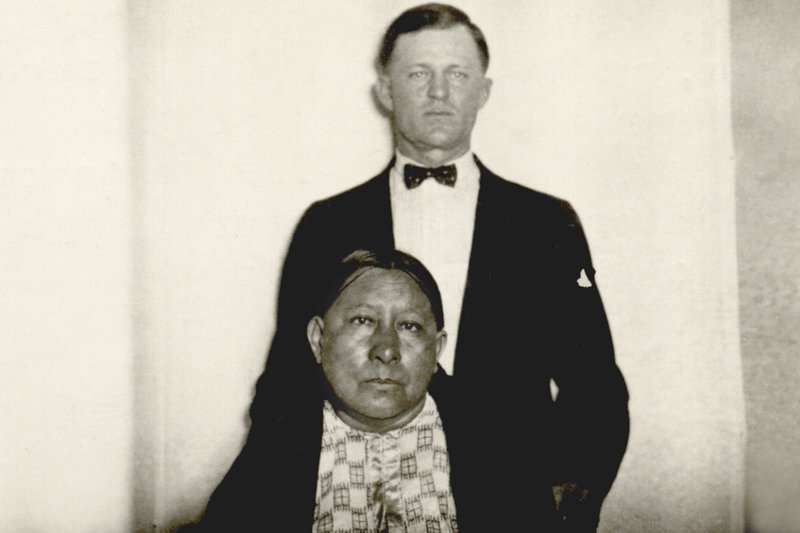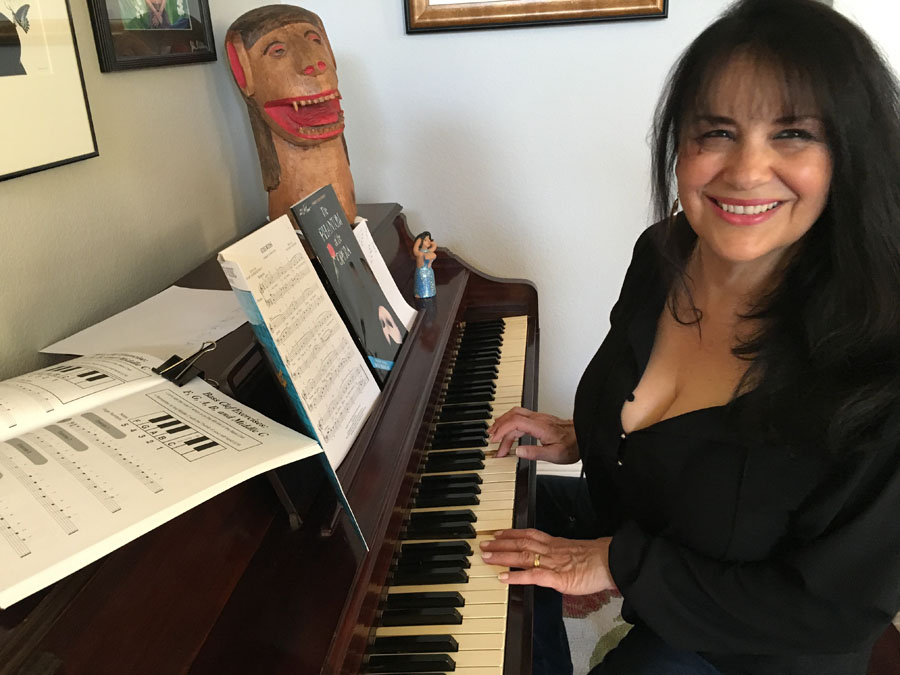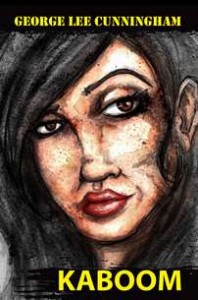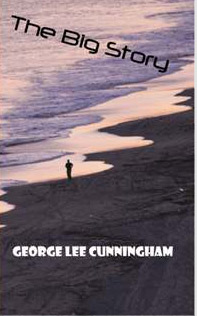FEATURED POSTS
-
February 11, 2018
Killers of the Flower Moon

MOLLIE BURKHART AND HER HUSBAND ERNEST. HER MOTHER AND THREE SISTERS WERE KILLED BEFORE HER HUSBAND WAS ARRESTED. SHE WAS BEING SLOWLY POISONED BY THE FAMILY DOCTOR, WHO TOLD HER SHE WAS RECEIVING MEDICINE FOR HER DIABETES. ERNEST LATER CONFESSED AND WAS SENTENCED TO LIFE IN PRISON. — Oklahoma Historical Society, Oklahoman Collection
I have never been a believer in the goodness of people.
Folks who go around saying “people are basically good,” have obviously come from some alien planet and have never met an authentic human being or they are massively self-deluded. We humans may do nice things once in a while, but we didn’t climb down from the trees and take over the world by being nice. Not then, not now.
What helps us transcend our base nature is culture and self-control. Culture at its best helps us live to a standard of decency, helps us to cooperate with one another and to overcome our reptilian instincts. At its worse, it inspires just the opposite.
One of the things that makes this depressingly clear is a well-researched book by author David Grann titled: Killers of the Flower Moon. It tells the story of the Osage Indians in 1920s Oklahoma. It’s one of those books that you read and then several days later you’re driving down the street or shopping for groceries and you’re still thinking about it. It’s a good book, but it is disturbing.
When the federal government in the 1870s decided to relocate the Osage Indians to a designated barren area in northern Oklahoma, the Indians negotiated a deal to retain the mineral rights. The government wanted to wean the Osage from their traditional culture and introduce them to private ownership of property, so the area was divided into privately owned tracts among the members of the tribe. Children were forced to undergo education to teach them how to conduct themselves in a modern English-speaking society. And since Indians were still considered savages, the Indians’ financial decisions and investments were to be dictated by white trustees.
But then the Indians struck it rich. In the early 20th Century oil was discovered beneath their ground and soon the Osage tribal members constituted one of the richest societies on the planet.
Although by the 1920s America was a relatively modern society, in the interior Western states the frontier mentality was still very much alive. White trustees – prominent ranchers, merchants, attorneys, physicians, and other respectable folks – oversaw the Indian’s finances and wealth. The trustees, who were supposed to protect the naïve Indians from making stupid choices, instead stole from the Indians in big ways and small – overcharging for goods and services and sometimes cooking the books. They also conspired with young male relatives to romance and marry Indian women. Then one by one they would kill off the members of the family until the white husband would be the only heir to all the oil wealth.
The trustees were aided in this practice by local lawmen, who looked the other way, physicians who would supply drugs to slowly poison members of rich Indian families, and judges who always sided with prominent white men over Indians.
In the bloody history of the 20th Century, the killing of Indians in Osage County might be considered an ugly footnote. At the most, there were probably only a hundred or so Indians killed.
What happened to the Osage Indians in the 1920s obviously doesn’t compare with the genocide of Jews in Germany, the killing of Armenians by the Turks, the bloody purges of political dissidents in the Soviet Union under Stalin and in China under Mao, or the wide-spread killing of educated Cambodian people by the Khmer Rouge.
Two things make the tragedy of the Osage Indians different. One is that it happened in America. And two is that it was a community affair, with lots of people who either participated in plots to kill entire Indian families or knew what was going on and looked the other way.
The killing of Indians was finally broken up by the newly formed Federal Bureau of Investigation. A team of investigators led by former Texas Ranger Tom White, worked around the clock to unravel the murders despite bureaucratic interference from the FBI’s young boss, J. Edgar Hoover.
In the end, some ringleaders were tried for murder and imprisoned, but many of the murders went unsolved and most of the participants escaped punishment. The ugly history of that time remains a bitter memory among descendants of the victims.
The book is disturbing. Civilization should make us better than this, and usually it does. But sometimes, it merely helps us excuse such behavior.
Osage County in Oklahoma during the 1920s was one of those times.
Do you have a dissenting opinion or any opinion at all on the subject? Contact me at george@georgeleecunningham.com and let me know. Meanwhile, you can always subscribe and get an email reminder of blog postings. Your name will not be shared and you may cancel at any time.
-
LYRICS, POETRY AND PROSE 180211
A place to share some words of beauty, inspiration, and fun. This week we have music by singer-songwriter Tish Hinojosa, who has been around a couple of decades, but whom I had never heard of because I was working too damn hard. I actually met Ms. Hinojosa last week up in Joshua Tree where she was doing a concert at the Beatnik Lounge. She is a middle-aged lady now with grown children, but she retains her same lovely voice and artistic vision. You can check her out and buy some of her CDs at her website at http://www.mundotish.com/ Click on the name of the piece to get a video.
‘Cause there’s something in the rain
But there’s more here in our hands
‘Buelita’s right about the sins of man
Who’s profits rape the landAnd the rains are pouring down
From the growers to the towns
And until we break the killing chains
There’s something in the rain– Something in the Rain Singer and Writer Tish Hinojosa
It’s the way of life in the real West
‘Neath the Prairie moon that’s Heaven blessed
And a tall boot shuffle on a wooden floor
It’s a clean white shirt on a Saturday night
And a long cold beer that’s pure delight
And if you heard me say it, there’s a whole lot more– In the Real West Singer and Writer: Tish Hinojosa
One more year rolls down the Rio Grande
Our forefathers crossed the muddy line
Pilgrims passing leaving tracks in time
One more takes a stand by the water by the landShifting like the sand by the Rio Grande
An unbroken chain snow and tears and rain
Cutting through my soul and to my veins
Then the water’s rise paint the Rocky Mountain skies– By the Rio Grande Singer and Writer: Tish Hinojosa
(English translation)
Tell me that you love me
Like that night
With those kisses at that certain place
Paint me mountain and desert
Starry skies on the horizonTell me that night; Tell me with love
– Aquella Noche Singer and Writer: Tish Hinojosa
-
January 30, 2018
The Piano Came Home

CARMELA TICKLES THE IVORIES — photo by George Cunningham
By Carmela Cunningham
Today I picked up my mother’s piano.
It had been sitting at my brother-in-law’s house in the Arizona desert for the previous five years. Before that it had moved from one person’s house or storage shed to another since my mother died 18 years ago.
I grew up with that piano in the house although I never played it. I wanted to play it, but for one reason or another, I never had the opportunity to take lessons.
I dusted and polished that piano about a million times growing up. I sat and picked at it now and again, but I never learned to play. Now in retirement – that part of life where we get to do everything we always wanted to do but never had time for – I have decided to learn to play.
I’ve been told by a woman who has made her living playing pianos and organs and even writing compositions, that I’m too old to learn – that I’ll never play well. Williametta is a tiny, straight-forward old lady, who says what’s on her mind.
“Well, I really want to learn,” I told her. “My age means that I’ll practice more and think more about it.”
“That doesn’t matter” she said, “you’re too old to become very good.”
“I don’t really expect to be very good,” I said. “Maybe just a little good.”
“Nope. You’re too old. You needed to start playing when you were 4 or 5 years old. Maybe even younger.”
The conversation went on like that for several minutes, but how well I learn to play the piano doesn’t really matter.
I go into it expecting that it will be hard, and that with my natural lack of rhythm, it’ll be frustrating, and that I’ll never be very good at all. But, I want to make music, and so I made arrangements to get my mother’s piano from its last home and to begin taking lessons.
Here’s what I didn’t expect. When I picked up the piano, it was dusty and scratched and sadly out of tune. George and I took it for a wild ride through the desert, where it broke free of its straps, rolled half-way across the 15-foot U Haul rental truck in which it rode alone, and somehow managed not to hit the sides or fall over.
We got it home and into the house. The keyboard cover wouldn’t open without quite a lot of coaxing. But I coaxed, and it opened. Then I rubbed down the whole thing with orange oil and called a piano tuner.
And that’s when my mother’s piano suddenly became my piano. I saw this piece of furniture that I had grown up with as something more than wood and metal and ivory keys. I saw it as something living.
There’s a relationship humans get with instruments that make music that we don’t get with other inanimate objects. I think it’s because instruments give us music. They speak to us. They sing to us. And because they sing to us, the instruments become as precious as the sounds they make, as precious as the people who play them, and as precious as the people who listen to them. They are forever capable of pulling up the memories and emotions that they first elicited.
I don’t know how to play the piano on this day that I bring home my mother’s piano. And, just as Williametta predicts, I’m sure I’ll never be very good at it. But today, as I plunked those out-of-tune keys, I fell in love with the piano I grew up with.
And that’s when my mother moved back home with me.
— Carmela Cunningham
-
Lyrics, Poetry and Prose 180129
A place to share some words of beauty, inspiration, and fun.
The first selection is a song I most remember my mother playing on the piano when I was young. I fell in love with it and I love it still.
The second piece is Edelweiss from the The Sound of Music. I first heard Edelweiss when I was ten years old and saw The Sound of Music. I cried when Christopher Plummer (as Captain Von Trapp) sang it before fleeing the Nazis. This is not a piano version, but that clip from the movie. My goal is to be playing Edelweiss on the piano one year from now.
And the last is a 1971 performance by the late Leon Russell, who married an extraordinary piano arrangement to vocals that feel almost acapella. How can you listen to this and not love the piano?
Click on the name of the piece to get a video.
This performance of Fur Elise is by a little girl named Hailey Meng in 2009. Hailey started playing when she was five years old. She is now a tenth grader – and still playing. This song is for Williametta.
– Fur Elise Piano Player: Hailey Meng; Composer Ludwig van Beethoven
Edelweiss, Edelweiss
Every morning you greet me
Small and white, clean and bright
You look happy to meet me
Blossom of snow may you bloom and grow
Bloom and grow forever
Edelweiss, Edelweiss
Bless my homeland forever– Edelweiss Singer: Christopher Plummer; Writers: Richard Rodgers and Oscar Hammerstein
Well you taught me precious secrets of a truth, withholdin’ nothin’
You came out in front but I was hiding
And now I’m so much better and if my words don’t come together
Just listen to the melody for my love’s in there hidingAnd I love you in a place where there’s no space or time
I love you for my life, you are a friend of mine
And when my life is over, remember when we were together
We were alone and I was singin’ my song for you– A Song for You Singer and Composer Leon Russell
-
December 22, 2017
OUR WICKED, WICKED PAST

I’m not a person who spends wistful hours longing for the good old days But sometimes, the good old days begin to sound better and better.
Back in the good old days, men and women not only liked and respected one another, but they lusted after one another as well. It wasn’t as though they were bad people. Most of them wanted to be good people, but the lustful devils inside them kept wanting to get out and play.
Fooling around during working hours is frowned upon, even if temptation abounds, so people would get together and let down their hair on special occasions – occasions such as the annual office Christmas party. In order to lower the threshold for the evil spirits to emerge, these parties often featured alcohol.
During these parties, people would behave badly, make fools of themselves, sometimes do things that they would later regret, and hopefully – but not always – learn from the experience. The Christmas party wasn’t exactly a sinful bacchanal, but it was a place where people could relax, get better acquainted, and be themselves. And after the celebration, the people in the workplace knew each other a little better, and appreciated each other as flawed and often silly human beings.
Sometimes all the alcohol not only brought out the playful side of people but on occasion the ugly side as well. And people remembered that too.
If somebody didn’t want to participate in the celebration, they usually left before the booze kicked in and the fun-loving devils emerged. And that was fine.
Getting together, drinking, and everybody letting down their hair, was not exactly a new idea among folks.
People in the old days and even in the old, old days, recognized this and set aside special times for it. Like Carnival or Mardi Gras, both wisely timed just before everybody had to give up something for Lent. For the unaware, Lent is a six-week-long religious observance during which Christians give up some pleasurable thing in repentance for their sins and in observance of Jesus’ 40 days fasting in the desert. It ends at the Easter holiday.
The Mardi Gras tradition began with pagan religion as a rite of Spring and fertility, but was folded into Christianity when the pagans converted. Since they already were going to spend six weeks repenting their sins, folks liked the idea off kicking up their heels a little before they had to ask for forgiveness.
So having a party and getting to know one another better is a long-standing human tradition.
Then the lawyers got involved, as they always do, and the politically correct began lamenting that some people were taking advantage of other people. They were not mistaken. People taking advantage of each other is something that human beings do. Some people are really good at it.
Shame on those people. We should ostracize them from polite company. In the meantime, that certainly doesn’t mean the rest of us should stop enjoying each other’s company, drunk or sober.
So now, the office Christmas parties – long-since renamed “Holiday” parties – are downright boring. One place we recently visited had a Holiday party so dreadful, that employees got together and held their own secret underground parties away from the prying eyes of senior management. We attended one of those parties and it was great fun.
In fact, it kind of reminded us of the good old days.
Do you have a dissenting opinion or any opinion at all on the subject? Contact me at george@georgeleecunningham.com and let me know. Meanwhile, you can always subscribe and get an email reminder of blog postings. Your name will not be shared and you may cancel at any time.






